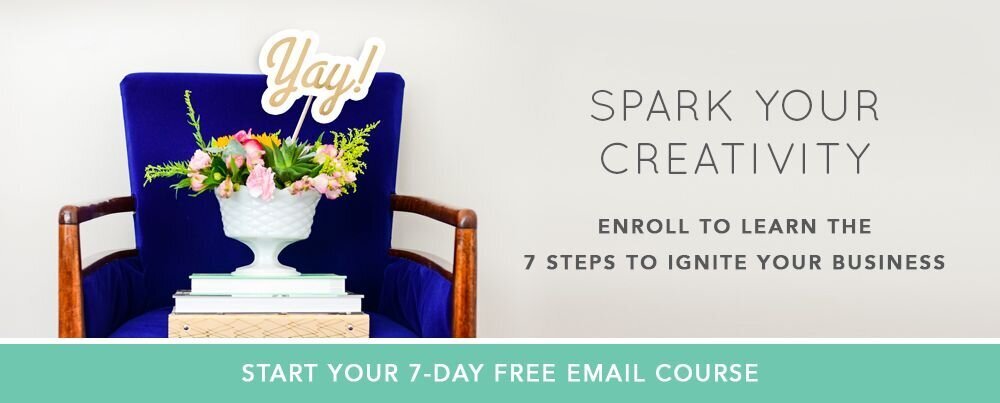The 10 Things You Need to Know Before Making Your Blog a Business
Abagail here. I always knew if I blogged it wasn’t just going to be for pleasure. That wouldn’t incentivize me enough to keep going. I had to make my blog profitable. It had to be an integral part of my business. It had to give to me, but it also had to give to my business.
Blogging for me hasn’t necessarily brought in the dollars and cents, but it has served as a foundation for my readers to turn into clients. When I started I really wish someone had sat me down and told me what I am about to tell you.
You have to have a clear niche.
Seems obvious enough, but trust me it isn’t. When you start, it is easy to get caught up in being everything to everyone. But then things don’t end up working and you end up capturing no ones attention. You have to deliberately shrink your niche down to a size that is so specific, people automatically know they can come to you to cover a certain subject.
I specialize in content that helps small business owners grow their business and simplify their social media. I focus on helping dreamers who are desperate to leave their full-time job to pursue their passion. And I create actionable tools for these creative entrepreneurs that are functional, usable and downright awesome!
You have to have a plan.
Call me silly, but would you drive across the country without a map? Ok, maybe not an Atlas, but at least a GPS? Before you begin blogging for business you have to know where you are currently located and where you want to go. Then create content that gets you from point A to point B.
I didn’t always have a plan. My first month blogging I tried to fill up every part of my life, by bringing it into my business. This included a DIY painting tutorial for my guest bedroom. It was fun, but not on point.
You have to be consistent.
If people know when they can count on you they are way more likely to come back. When this adventure began I consistently posted every M-F with posts live at 5 a.m. CST. After publishing more than 100 posts, I scaled back to 4 posts a week, which makes my life a little more manageable.
When and how often are you going to post? Tell your audience so they know when to count on you.
You have to know where to draw the line.
What will you do and won’t you do for your blog? Are you willing to sacrifice the look for paid ads? Are you ok with affiliate links or posts? Define what is going to work for your business and stick to it. Working this out in advance makes it much easier to decide what you are going to do when opportunities come knocking.
You have to step back and analyze what is and isn’t working.
It is pretty easy to get in the swing of things and not do a little self-analysis on what is and isn’t working. Pay attention to your analytics. What posts naturally get more hits? Do some graphics perform better on certain social media platforms? What are people sharing? What stays popular long after it is posted?
Track how you post on social media and then analyze the results at the end of every week.
You have to be dedicated.
Blogging for pleasure is one thing, however, if you decide you are going to do it for business I urge you to be dedicated. This isn’t some crash diet, it is your business and it has to be taken seriously. Start by making small changes. Let them compound over time. Make blogging a habit you cannot give up. Make it a ritual. Make it a time of reflect.
You must keep up the impeccable quality.
I refuse to write chintzy blog posts. If I am going to take the time to lure you in with quality social media and rocking graphics, then I better have meat when you bite in!! Focus on fabulous quality. I know you don’t want to hear it, but you are only as good as your worst work. If you don’t think what you are writing is up to par with your other content, it is best to wait to be inspired than put something out that you aren’t proud of.
You have to know not all readers are buyers and not all buyers are readers.
Someone told me this one-day and it hurt a little. But instead of letting the sting stay, I learned to embrace it. Create content that works towards converting one to the other. Ideally, your ideal reader should also be your ideal client. If it isn’t, then something is going to have to shift to accommodate.
You have to showcase your expertise.
Consider your blog your long form sales letter. Over time they begin to pick up on your expertise. If you’re an expert health coach, why would you blog about social media? Or why would a DIY crafter chat about dieting? It doesn’t make sense to your reader. Your expertise, particularly when blogging for business, must directly align with your products and services. It can be a platform to introduce your readers into the behind the scenes of your business. Use it as a way to promote your best qualities and place emphasis on your strengths.
You have to know how to capture your readers’ information.
A couple weeks ago, I introduced you to the idea of a sales funnel. Blogging can be an integral piece of the puzzle to really capture someone and later convert him or her to a sale. The big piece, once they are here and reading or perhaps even reading regularly, is to get them to hand over their personal information such as their name and email address.


